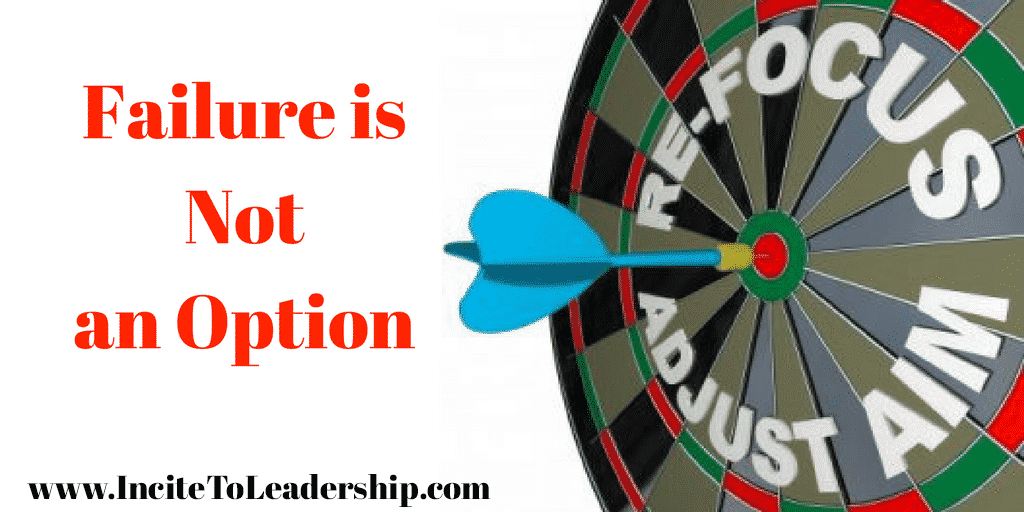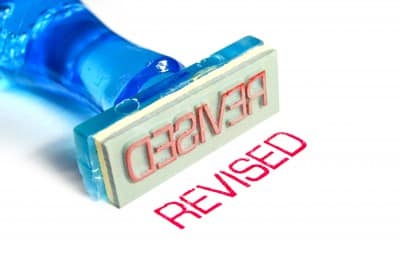Failure is Not an Option

It’s May 2013 – have you met your 2013 goals yet? More importantly – are you ready to fail at them?
On a recent trip changing planes in the Houston airport, I walked past a t-shirt kiosk with “I Love Texas” tees and various sayings. One had the motto “Failure is not an option” boldly printed. I kept walking but realized this motto had really rubbed me the wrong way.
Why? Well, in a recent coaching mastermind group I led, as everyone discussed goals for the New Year, when I asked questions about failure, everyone suddenly became tongue-tied. Very few had ideas for how to fail without losing face or how to more easily recover from failures. In entrepreneurism (and in life), planning to not fail misses the point – what we need to do is to get better at failure and do it more often.
Does failure feel pessimistic to you? Do you conflate failure with giving up on your dreams? Not in my world! I think the cold hard truth is that as entrepreneurs we are not prepared enough for failure. New businesses fail all the time (according to some estimates 85% of new businesses fail in the first year alone!) What I’ve always wondered about that number is how much is all-out failure and how much is giving up in the face of early set-backs? Early failure is often just a signpost that our first path forward isn’t working, so it’s time to regroup and find another path.
 In a culture demanding fast solutions and success, the typical entrepreneurial down-cycles can spiral out of control if you aren’t prepared for these normal early failures. Thus holding to the mindset that “failure is not an option,” might block your route to true persistence. Instead, developing a comfortable relationship with failure, or at the very least, a grudging realization that it’s part of the business cycle is an attitude that would greatly benefit and develop entrepreneurs.
In a culture demanding fast solutions and success, the typical entrepreneurial down-cycles can spiral out of control if you aren’t prepared for these normal early failures. Thus holding to the mindset that “failure is not an option,” might block your route to true persistence. Instead, developing a comfortable relationship with failure, or at the very least, a grudging realization that it’s part of the business cycle is an attitude that would greatly benefit and develop entrepreneurs.
Research by Carol Dweck at Stanford (author of “Mindset”) proves that if you want to encourage kids to keep working hard and trying, you shouldn’t praise what they have accomplished but instead compliment the hard work and dedication that went into their accomplishment. Apparently, acknowledging the achievement puts the value only on achieving, so kids become reluctant to take on greater challenges and fail. For our kids, and ourselves, the mindset to embrace is one of growth and risk, even if this means there will be inevitable failures along the way.
 It is actually the willingness to try something new, to risk both greatness and defeat at the same time, that distinguishes many of the business greats we see lauded in the newspapers and magazines. I personally was struck by how many times (and often colossally) Steve Jobs failed both at Apple and NeXT and many consider him one of the greatest business geniuses of his time. Certainly, as I type on my MacBook air, I am a big fan of his ability to conceive new products and designs.
It is actually the willingness to try something new, to risk both greatness and defeat at the same time, that distinguishes many of the business greats we see lauded in the newspapers and magazines. I personally was struck by how many times (and often colossally) Steve Jobs failed both at Apple and NeXT and many consider him one of the greatest business geniuses of his time. Certainly, as I type on my MacBook air, I am a big fan of his ability to conceive new products and designs.
As an entrepreneur, you too need to be risking failure, if not daily, then at least on a consistent basis. Asking clients for new business (they could say no). Trying a new marketing strategy (it could bomb). Launching a new product of service (what if no one buys it?) I suspect that when we are willing pursue goals, even in the face of a likely degree of failure, we know we’ve found what’s meaningful to us and closest to our hearts.
So the questions I would leave you with is for 2013 are:
1. When was the last time you failed and what did you learn? How can you apply this to an important project for 2013
2. What 3 goals do you have for this next year, that you are so passionate about, you are willing to fail at? (Hint, being specific works better.)
3. What are the markers of success and failure? When do you decide that an effort has succeeded, needs to be revised, or is ready to be scrapped in your business? What is your timeline for evaluation?
In academia there is a great term – “revise and resubmit.”
 It means that a scholarly publication is good enough to be considered for an academic journal but needs some more work (usually an intense effort) before it quite there yet. I think the “Revise and Resubmit” way of thinking should replace the failure/success divide we’ve learned to judge ourselves by. For 2013 let’s develop our ability to put ourselves the line, get great learning, take it into consideration and revise appropriately for our next pass out of the gate.
It means that a scholarly publication is good enough to be considered for an academic journal but needs some more work (usually an intense effort) before it quite there yet. I think the “Revise and Resubmit” way of thinking should replace the failure/success divide we’ve learned to judge ourselves by. For 2013 let’s develop our ability to put ourselves the line, get great learning, take it into consideration and revise appropriately for our next pass out of the gate.
This year, I started a series of tele-calls on relevant topics like these, redefining failure, success and the terms we live by as entrepreneurs. I hope you’ll join me for the second half of the series and participate in answering these questions.